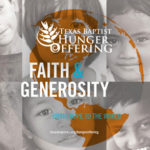The Community Distribution Partners program involving Royal Haven Baptist Church is one of 10 proven strategies the faith community action team of the Dallas Coalition for Hunger Solutions identified to fight hunger.
Jana Jackson, director of family and community ministries at Dallas Baptist Association, helps lead the coalition’s action team to engage churches and other faith groups in effective hunger-fighting approaches.
Community Distribution Partners uses a “hub-and-spokes” distribution model to increase the efficiency of food distribution in areas of greatest need. Crossroads Community Services, an urban outreach ministry created by First United Methodist Church in Dallas, serves as the hub, obtaining food in bulk from the North Texas Food Bank. Other churches and community ministries serve as the spokes of the wheel, distributing groceries to clients in their neighborhoods.
The coalition’s faith community action team identified nine other strategies. While some are specific to the Dallas area, most can be replicated throughout the state. They are:
- The Summer Meals Program of the U.S. Department of Agriculture provides summertime nutrition for children and teenagers who receive free or reduced-price meals during the school year. Churches can serve as meal sites or can provide volunteers to staff a site in their community, and they can provide enrichment activities for students before or after meals.
- The Community Partner Program enlists congregations to help people use online resources to apply for and manage public benefits.
- Cooking Matters is a six-week program that teaches participants how to be smart grocery shoppers, make healthier nutritional choices and cook affordable meals. Churches can offer classes and involve members as teachers.
- Meals on Wheels (www.mealsonwheelsamerica.org/) delivers nutritious, freshly prepared meals to people who cannot provide for themselves due to advanced age, illness or disability. Congregations can enlist and coordinate volunteers to deliver meals.
- The Family Garden Initiative helps churches and other groups teach their neighbors—particularly in urban areas—how to grow nutritious food in small gardens in backyards or apartment patios.
- Community Gardens provide fresh vegetables for families in urban areas and supply produce for food pantries. Congregations are encouraged to turn nonproductive plots of land into community gardens, developed in partnership with the individuals who benefit from what is grown.
- Congregate Meals offer balanced, nutritious meals for older adults at a senior center. The social setting allows the senior adults interaction with peers, and meal sites also may provide nutrition education classes. Churches can provide volunteers for the senior centers or sponsor a Congregate Meal site.
- Nourishing Neighbors is a volunteer-driven program of the North Texas Food Bank that delivers groceries to homebound senior adults and mature adults with disabilities. Participants receive at least 10 pounds of nutritious, easy-to-prepare food, including fresh fruit and vegetables, every-other week. Churches can recruit volunteers to deliver groceries or interview applicants for enrollment, and they can become a distribution hub to serve seniors in locations across the 13 counties the North Texas Food Bank serves.
- Nutrition Education through the Texas A&M AgriLife Extension Service incorporates research-based, practical lessons in basic nutrition, food preparation, food budget management and food safety in settings convenient for participants. The Expanded Food and Nutrition Education Program helps families with children, and Better Living for Texans is designed for adults on public assistance programs. Churches can schedule the programs for their members or serve as host sites for programs in their communities.














We seek to connect God’s story and God’s people around the world. To learn more about God’s story, click here.
Send comments and feedback to Eric Black, our editor. For comments to be published, please specify “letter to the editor.” Maximum length for publication is 300 words.